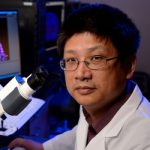Program Leaders
The nervous system’s capacity for growth and change underlies everything from proper mental development to the body’s coordination and movement. IRM researchers study how neurons develop in different stages of life, why the neurons in limbs regenerate better than in the brain, and how dysregulation leads to diseases including autism spectrum disorder, schizophrenia, and glioblastoma.
The IRM Program in Neurodevelopment and Regeneration brings together scientists from across the Penn’s Schools of Medicine, Arts and Sciences, and Engineering and Applied Sciences. These researchers employ sophisticated models of neurodevelopment ranging from small animals to patient-derived induced pluripotent stem cells (iPSCs) to study the mechanisms underlying the normal functions of axons, as well as their development, myelination, degeneration, and the regenerative response to injuries. Researchers in this program have made groundbreaking discoveries that have advanced our knowledge of the regenerative potential of parts of the adult brain and the brain’s response to infection disease.


